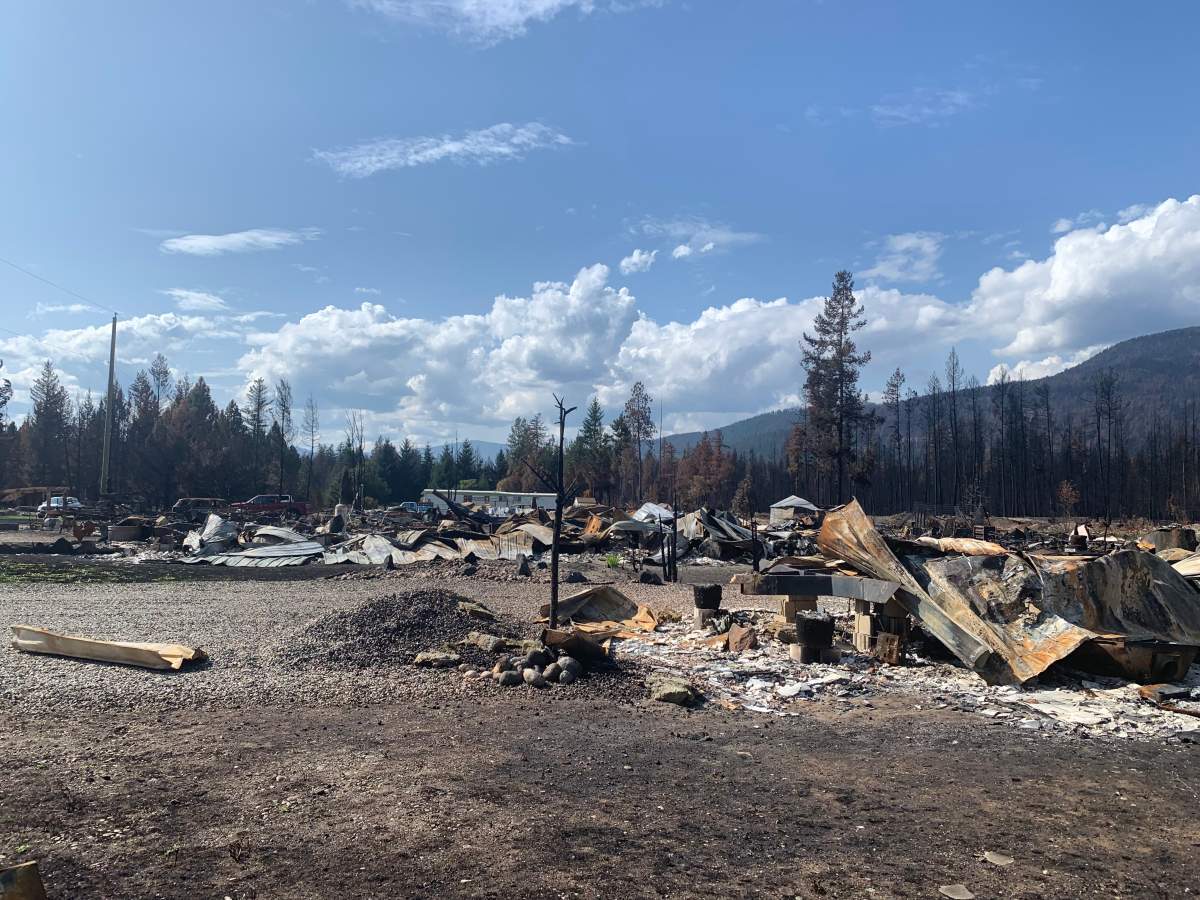The fire hall at Scotch Creek is in shambles, one of many structures destroyed by the Bush Creek East wildfire.

On Wednesday, local residents and the media toured the North Shuswap, where more than 200 homes were destroyed.
The Columbia Shuswap Regional District said 176 homes were lost while the First Nation of Skwlax te Secwepemcúl̓ecw (Little Shuswap Lake) said 85 structures were destroyed.

Video of the tour taken by Global News shows untold blackened and scorched trees. The wildfire is estimated at 43,084 hectares and is deemed to be out of control, though it hasn’t grown in size since Aug. 31.
The deputy regional fire chief, Sean Coubrough, said it had “some of the most extreme fire behaviour I’d ever seen, plus it was travelling in leaps and bounds.”
A 15-year member of the fire hall, Brian Dalgleish says the building went up in flames on Friday, Aug. 18, when, fanned by winds, the wildfire exploded in size that week.
“We were staged in front of the hall, trying to figure out our next course of action,” he told Global News.
“And once we saw the fire coming up behind us here, that was time to move. So we decided to back off and get to a safer zone.”
Dalgleish called it an emotional loss, saying, “Obviously, the fire hall is here to protect the community and to see it … you know, go up flames …”

Get daily National news
He continued, saying, “It wasn’t something we were expecting to see. I mean, that’s our fire hall. We’ve been there, we’ve brought a lot of people in there … a lot of friends in there and we consider ourselves a family.
“So, it’s our house, and now seeing it like this.”
Dalgleish noted, though, that nobody died or got hurt, and “we’ll rebuild,” adding, “our family will still be here and we’ll keep going.”
Derek Sutherland of the local emergency operations centre says the number of destroyed structures and partially destroyed structures (50) within the regional district could change, but not too dramatically.
Tim Conrad of emergency operations said “we haven’t been to every area yet. We haven’t been able to access every area due to the safety that’s in some areas, so we expect that that will possibly see more numbers.”
In the afternoon, local officials began downgrading evacuation orders in the area to evacuation alerts, resulting in residents being allowed to return home – for the first time in three weeks for some.
More downgrades are expected at 4 p.m., then 7 p.m.
“We’re just trying to make the process as smooth as possible,” said Sutherland, adding BC Wildfire, BC Hydro and Telus crews are still in the area.

“The (time staggering) is just to keep the traffic down and allow people the chance to get in, unobstructed, and to make the area safe.”
Asked about the devastation, Sutherland said, “It’s been absolutely astonishing how devastating it is. My heart goes out to the residents who have lost their homes. Even the ones who haven’t lost their homes would have been displaced by this.”
Sutherland estimated the 176 lost homes translates into more than 300 displaced residents.
“Right now, we’re focused on supporting those people and helping them through the recovery process and the rebuilding process.”
On Wednesday, the provincial government announced that disaster financial assistance (DFA) is now available for local governments and First Nations in regions that have been adversely affected by wildfires.
“DFA is available to help community authorities cover disaster-related losses that are not covered by insurance, such as wildfire damage to public infrastructure, including roads, bridges and other publicly owned infrastructure,” said the province.
More information about DFA is available online.











Comments